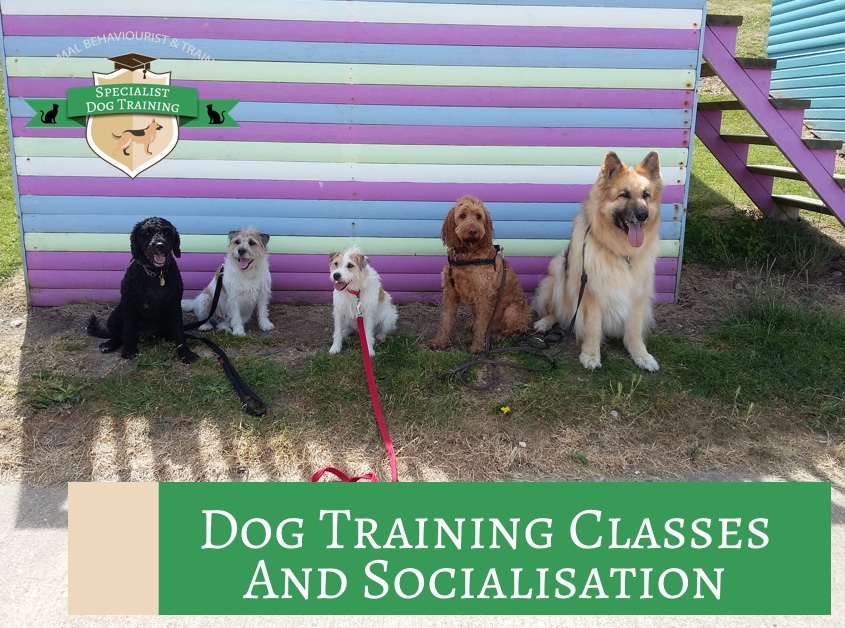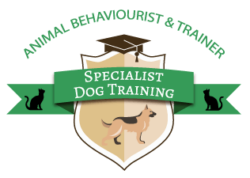Here at Specialist Dog Training, we take the current Covid-19 crisis very seriously so for now, dog training classes have been suspended until further notice. In the meantime, let’s use this as a positive opportunity to really think about what you want to achieve, learn and gain from dog training classes.

Socialisation has always been top of the list for owners, a main proportion of the reason they attend class:
- Puppy owners requesting to bring their puppy to class so that they can play with
- other puppies, as this will socialise them with other dogs.
- Dog owners asking to join a class so that their over excited dog, or recently rehomed dog, can play and meet the other dogs at class so they can teach them how to behave.
- Dog owners who have dogs with behaviour issues, such as lunging towards other dogs, or jumping on other dogs when greeting them etc, wish to work around other calm dogs.
However, the above list isn’t really the right reasons to attend a dog training class.
Let’s look at what socialisation really is: It is a highly complex process that is ongoing throughout the puppy and dog’s life. It is not just about interacting with dogs, but interacting with people, responding to the owner and being taught how to behave in
public, the home, etc. Those are just some examples of socialisation but there are plenty more!
Dog training classes should be structured and provide a safe environment for both dogs and owners. Classes are there to educate the owner on how to keep their dog safe, teaching life skills in training exercise, learning how to keep their dog’s focus and how to teach the dog to be calm and relaxed in the presence of other dogs/people.
The downside of just focusing on the dog interacting with other dogs or people and allowing your dog to run up to them are:
- A dog could be on lead and this could be for a number of reasons: elderly dog, a dog that has either a hearing or sight impairment, recovering from an illness/surgery, poor recall, the dog is in training, poor recall, etc.
- A person that may be in the park, could be nervous of dogs, jogging, the family could be out for a walk, and so on.
- Legislation such as the Dangerous Dogs Act applies to all dogs. The law states that your dog just needs to be out of control for the dog to be deemed dangerous.
- There is lots in the social media about dog theft – having a dog that is over friendly with people or perhaps does not respond well to recall, could be a hazard when the dog is off lead in the park.
- Over excited dogs that have enjoyed playing and interacting too much with other dogs, can result in an obsessed dog that will pull towards other dogs, bark, jump up and down and this could result in lunging and becoming frustrated as they cannot get to the other dog.
- Some dogs do not appreciate another dog running up to them, barking as they run towards them, lunging at them when both dogs are on lead, jumping on them, chasing them, taking their ball or toy away, jumping up at the owner, the list for this is endless and can result in a dog fight.
- Play is all about your dog learning what works for them, good or bad it teaches behaviours that the dog uses throughout its life.
Being able to control your dog through loose lead walking, recall, sitting, etc is all about training your dog the life skills it needs to be safe. It is not cruel to prevent your dog from running up to other dogs and people, it is teaching your dog manners.
Back to our question on what socialisation really is all about:
- Teaching your dog to be comfortable around different sounds, sights, locations, etc that they will come across in their lifetime.
- Teaching your dog how to behave in certain situations – busy environments, around other dogs and people – this could mean how to be calm and relaxed, etc.
- Teaching your dog that they need to focus on the owner, listen and respond in any situation.
- Teaching your dog to be confident because incorrect socialisation could result in a fearful dog or a fearful reaction.
- Too much play fighting with other dogs, can result in over friendly dogs who are more interested in other dogs, which may lead to inappropriate responses, lack of recall and owner control.
Training classes help to educate owners on all that we have covered above, how you should be your dog’s world! Dog training classes should also teach owners how to play with their dogs, train their dogs, build a strong relationship with their dogs and put in boundaries and consistent training.
Training can be fun, however owners can rush through the basics and this can also lead to issues with the presenting lots of different actions in the hope that one get them a reward, or owners who start adding in different words or additional words as they think their dog responds to them, again the list is endless.
Training classes help build a solid foundation to work from. Good trainers help expand on your knowledge, teach you how to progress your training for you and your dog and help proof the training you have already started. Good trainers are not afraid to impart their knowledge and skills.
Why not use this time during COVID to find the right trainer or right training class for you and your dog. Find the inspiration to want to start your dog training journey.
